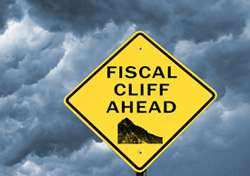Fiscal cliff could affect state courts already faced with budget constraints

The nation's decision makers continue to wrestle with the consequences of going over the "fiscal cliff" at year's end, which may translate to cuts in federal funding in many state budgets.
The trickle-down effect could cause more problems for state courts that have fallen victim to massive budget shortfalls during the recession, according to G. Alan Tarr, a professor of political science at Rutgers-Camden.
"When revenues decrease as they have during the recent recession, states have to look for places to cut in order to balance their budget," says Tarr, an internationally noted constitutional scholar. "Some states cut across the board and others pick out areas in which funds aren't being well spent. In any case, state courts tend to get hit, which precipitates concerns about the administration of justice."
Tarr opines on the issue in his article, "No Exit: The Financial Crisis Facing State Courts," recently published in the Kentucky Law Journal.
Tarr directs the Rutgers-Camden Center for State Constitutional Studies. He has consulted with numerous state legislatures and Supreme Courts on the complexities of state constitutions. says a majority of funding for state courts – which makes up about 2 or 3 percent of a state budget – accounts for salaries for judges, clerks, and other core personnel. Therefore, Tarr says budget cuts to the courts tend to take the form of reducing personnel.
"The cuts in turn have forced state court systems to adopt measures to reduce costs, such as cutting hours and employees, which jeopardizes the administration of justice," Tarr says.
In his article, Tarr notes that in fiscal years 2009, 2010, and 2011, state budget shortfalls have totaled more than $530 billion, leading to dramatic reductions in funding for state courts.
If cuts have to be made at the federal level as a result of the so-called fiscal cliff, they will include funding that goes to the states, creating more of a burden on entities like the courts, Tarr says.
"The problem for state courts is that there are many other worthwhile uses for this revenue within the state budgets," he notes. "The courts are competing against education, Medicaid, and other state functions."
Tarr says the American Bar Association became very concerned about funding for state courts and in 2011 formed a task force to look at the fiscal issues affecting the courts and what could be done about them.
"There are two possibilities," he says. "The states can increase the portion of the state budget that goes to the courts, or can increase the pool so that they get the same percentage, but there's more revenue."
In any case, Tarr says there is no light at the end of the tunnel for underfunded state courts.
"The state courts are, for the foreseeable future, going to continue to face declining funding," he says. "They'll have to find ways to work more expeditiously to continue to deliver the administration of justice."
Tarr, a Camden resident, is the co-author of numerous books, including State Supreme Courts in State and Nation (Yale University Press, 1990), American Constitutional Law (Westview Press, 2009), now in its eighth edition, and Without Fear or Favor: Judicial Independence and Judicial Accountability in the States (Stanford University Press, 2012).
Provided by Rutgers University














